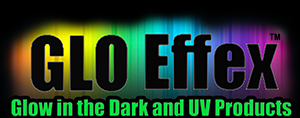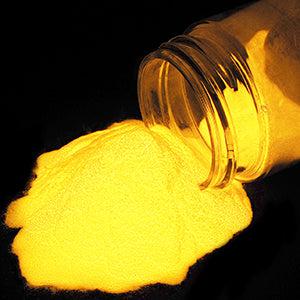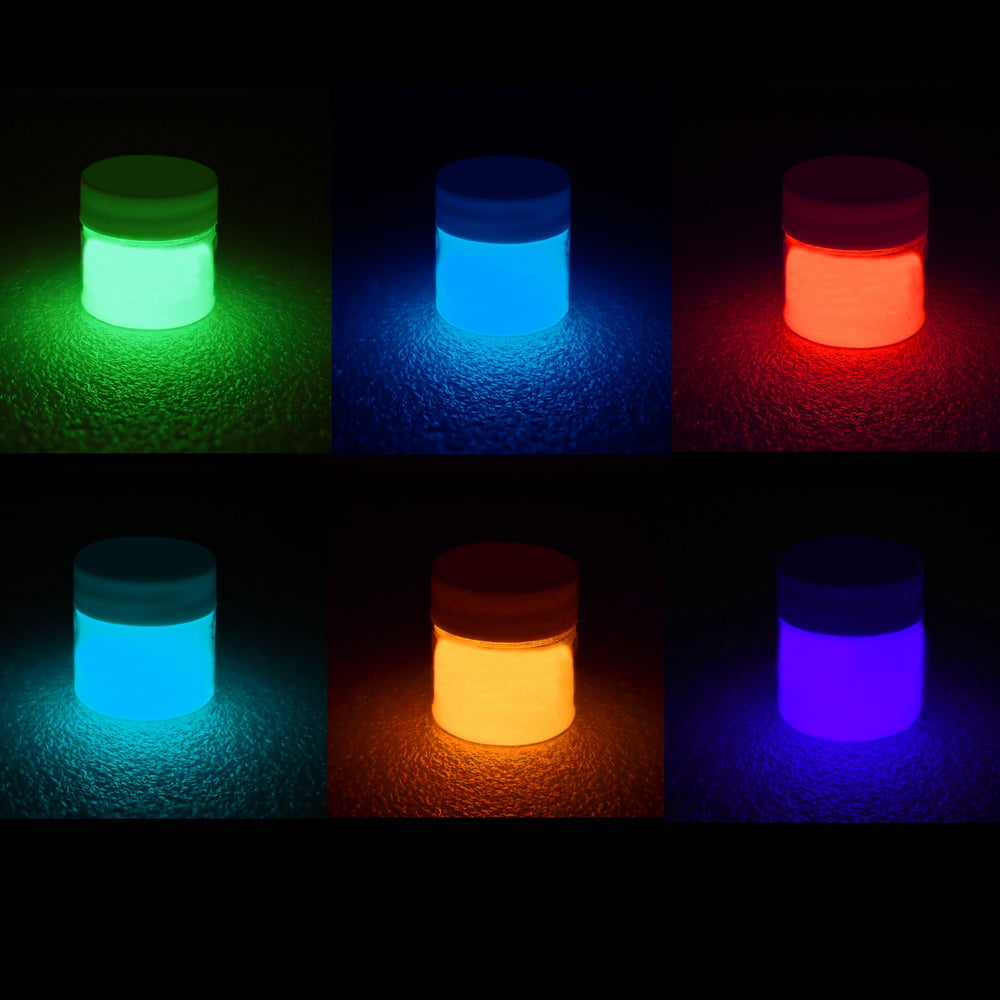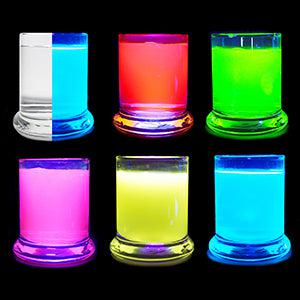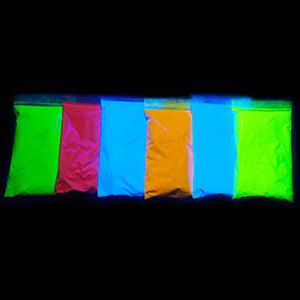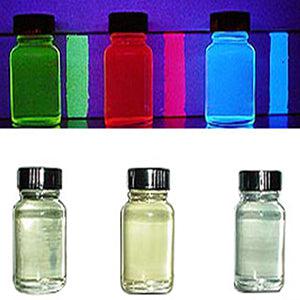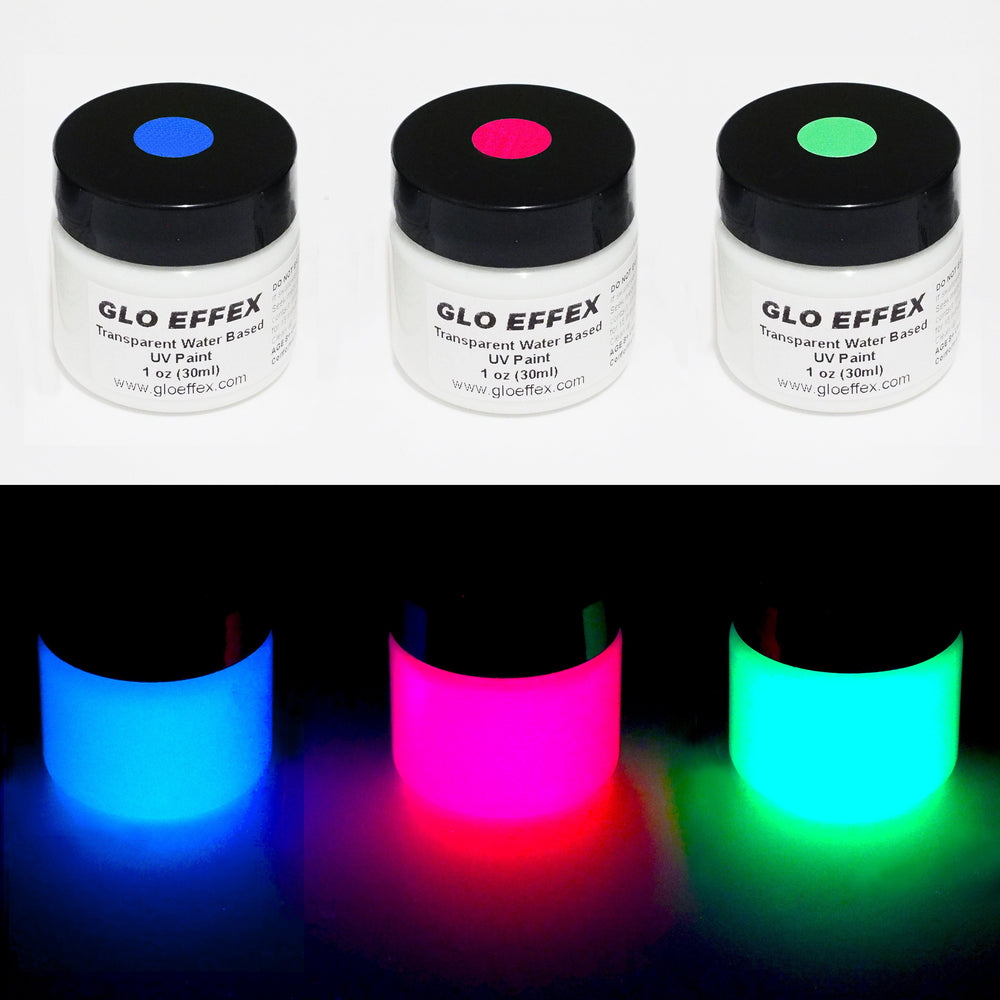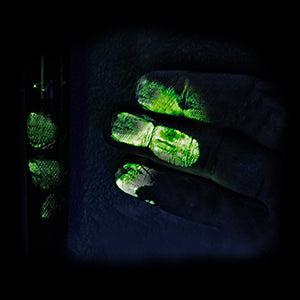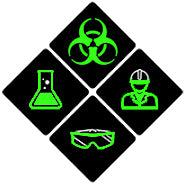SAFETY DATA SHEET
1. Identification Product identifier
Product name: Super Phosphorescent Glow in the Dark Paint Trade Name: GLO Effex Glow in the Dark Paint
Recommended use of the chemical and restrictions on use
Application: Medium for Acrylic Painting
Uses advised against: No specific uses advised against are identified.
Details of the distributor
Company:
GLO Effex
Murrieta, CA 92563
951-290-2775
sales@gloeffex.com
Emergency telephone: For health information 1-800-628-3385
2. Hazard(s) identification Classification of the substance or mixture
Physical hazards: Not Classified Health hazards: Not Classified Environmental hazards: Not Classified
Label elements
Hazard statements: NC Not Classified
Other hazards
This product does not contain any substances classified as PBT or vPvB. 3. Composition/information on ingredients
Mixtures
Composition comments: Any hazardous ingredients are below classification limit.
General information If in doubt, get medical attention promptly. Show this Safety Data Sheet to the medical personnel.
4. First-aid measures Description of first aid measures
Inhalation: No specific recommendations. If throat irritation or coughing persists, proceed as follows. Move affected person to fresh air and keep warm and at rest in a position comfortable for breathing. Loosen tight clothing such as collar, tie or belt. Get medical attention if any discomfort continues.
Ingestion: No specific recommendations. If throat irritation or coughing persists, proceed as follows. Rinse mouth. Get medical attention if any discomfort continues.
Skin Contact: No specific recommendations. Rinse with water. Get medical attention if any discomfort continues.
Eye contact: Rinse with water. Get medical attention if any discomfort continues.
Protection of first aiders: Use protective equipment appropriate for surrounding materials.
Most important symptoms and effects, both acute and delayed
General information: The severity of the symptoms described will vary dependent on the concentration and the length of exposure.
Inhalation: No specific symptoms known. Spray/mists may cause respiratory tract irritation. Ingestion: No specific symptoms known. May cause discomfort if swallowed.
Skin contact: No specific symptoms known. May cause discomfort.
Eye contact: No specific symptoms known. May be slightly irritating to eyes.
Indication of immediate medical attention and special treatment needed Notes for the doctor: Treat symptomatically.
Specific treatments: No special treatment required.
5.Fire-fighting measures
Extinguishing media
Suitable extinguishing media: The product is not flammable. Extinguish with alcohol-resistant foam,
carbon dioxide, dry powder or water fog. Use fire-extinguishing media suitable for the surrounding fire. Unsuitable extinguishing media: Do not use water jet as an extinguisher, as this will spread the fire. Special hazards arising from the substance or mixture
Specific hazards: Containers can burst violently or explode when heated, due to excessive pressure build-up.
Hazardous combustion products: Thermal decomposition or combustion products may include the following substances: Harmful gases or vapors.
Advice for firefighters
Protective actions during firefighting: Avoid breathing fire gases or vapors. Evacuate area. Cool containers exposed to heat with water spray and remove them from the fire area if it can be done without risk. Cool containers exposed to flames with water until well after the fire is out. If a leak or spill has not ignited, use water spray to disperse vapors and protect men stopping the leak.
Special protective equipment for firefighters: Wear positive-pressure self-contained breathing apparatus (SCBA) and appropriate protective clothing. Firefighter's clothing conforming to European standard EN469 (including helmets, protective boots and gloves) will provide a basic level of protection for chemical incidents.
6. Accidental release measures
Personal precautions, protective equipment and emergency procedures
Personal precautions: No specific recommendations. For personal protection, see Section 8. Environmental precautions
Environmental precautions: Avoid discharge into drains or watercourses or onto the ground. Methods and material for containment and cleaning up
Methods for cleaning up: Reuse or recycle products wherever possible. Absorb spillage to prevent material damage. Flush contaminated area with plenty of water. Wash thoroughly after dealing with a spillage. Dispose of contents/container in accordance with national regulations.
7. Handling and storage Precautions for safe handling
Usage precautions: Read and follow manufacturer's recommendations. Wear protective clothing as described in Section 8 of this safety data sheet. Keep away from food, drink and animal feeding stuffs. Handle all packages and containers carefully to minimize spills. Keep container tightly sealed when not in use. Avoid the formation of mists.
Advice on general occupational hygiene: Wash promptly if skin becomes contaminated. Take off contaminated clothing and wash before reuse. Wash contaminated clothing before reuse.
Conditions for safe storage, including any incompatibilities
Storage precautions: No specific recommendations. Storage class: Unspecified storage.
8. Exposure Controls/personal protection
Exposure controls
Appropriate engineering controls: No specific ventilation requirements.
Eye/face protection: No specific eye protection required during normal use. Large Spillages: Eyewear complying with an approved standard should be worn if a risk assessment indicates eye contact is possible.
Hand protection: No specific hand protection recommended. Other skin and body protection: No specific recommendations
Hygiene measures: Wash hands thoroughly after handling. Do not eat, drink or smoke when using this product. Wash contaminated clothing before reuse.
Respiratory protection: No specific recommendations. Provide adequate ventilation. Large Spillages: If ventilation is inadequate, suitable respiratory protection must be worn.
Environmental exposure controls: Not regarded as dangerous for the environment.
9. Physical and Chemical Properties
Information on basic physical and chemical properties
Appearance: Liquid
Color: White
Odor: Characteristic. Ammonia
pH: pH (concentrated solution): 9-10
Initial boiling point and range: >100°C @ 760 mm Hg Vapour density: >1.
Relative density: 1.1 @ 20. C°C
Solubility(ies): Miscible with water
10. Stability and reactivity
Reactivity: There are no known reactivity hazards associated with this product.:
Stability: Stable at normal ambient temperatures and when used as recommended. Stable under the prescribed storage conditions.
Possibility of hazardous reactions: No potentially hazardous reactions known.
Conditions to avoid: There are no known conditions that are likely to result in a hazardous situation.
Materials to avoid: No specific material or group of materials is likely to react with the product to produce a hazardous situation.
Hazardous decomposition products: Does not decompose when used and stored as recommended. Thermal decomposition or combustion products may include the following substances: Harmful gases or vapors.
11. Toxicological information Information on toxicological effects
Toxicological effects: Not regarded as a health hazard under current legislation. Acute toxicity – oral
Notes (oral LD50): Based on available data the classification criteria are not met. Acute toxicity - dermal
Notes (dermal LD50): Based on available data the classification criteria are not met. Acute toxicity - inhalation
Notes (inhalation LC50): Based on available data the classification criteria are not met. Skin corrosion/irritation
Animal data): Based on available data the classification criteria are not met. Serious eye damage/irritation
Serious eye damage/irritation): Based on available data the classification criteria are not met. Respiratory sensitization
Respiratory sensitisation): Based on available data the classification criteria are not met. Skin sensitisation
Skin sensitization): Based on available data the classification criteria are not met. Germ cell mutagenicity
Genotoxicity - in vitro): Based on available data the classification criteria are not met. Carcinogenicity
Carcinogenicity): Based on available data the classification criteria are not met.
IARC carcinogenicity: None of the ingredients are listed or exempt.
Reproductive toxicity): Based on available data the classification criteria are not met. Reproductive toxicity- fertility -): Based on available data the classification criteria are not met.
Reproductive toxicity development): Based on available data the classification criteria are not met. Specific target organ toxicity - single exposure
STOT - single exposure: Not classified as a specific target organ toxicant after a single exposure. Specific target organ toxicity - repeated exposure
STOT - repeated exposure: Not classified as a specific target organ toxicant after repeated exposure. Aspiration hazard
Aspiration hazard: Based on available data the classification criteria are not met.
General information: No specific health hazards known. The severity of the symptoms described will
vary dependent on the concentration and the length of exposure.
Inhalation: No specific symptoms known. Spray/mists may cause respiratory tract irritation.
Ingestion: No specific symptoms known. May cause discomfort if swallowed.
Skin Contact: No specific symptoms known. May cause discomfort.
Eye contact: No specific symptoms known. May be slightly irritating to eyes.
Acute and chronic health hazards: No specific health hazards known.
Route of entry: Ingestion Inhalation Skin and/or eye contact.
Target Organs: No specific target organs known.
Medical Symptoms: Irritation of eyes and mucous membranes.
12. Ecological Information
Ecotoxicity: Not regarded as dangerous for the environment. However, large or frequent spills may have hazardous effects on the environment.
Toxicity
Toxicity: Based on available data the classification criteria are not met.
Acute toxicity – fish: Not determined.
Acute toxicity - aquatic invertebrates: Not determined. Acute toxicity - aquatic plants: Not determined.
Acute toxicity – microorganisms: Not determined.
Persistance and degradability
Persistence and degradability: The degradability of the product is not known.
Bioaccumulative potential
Bio-Accumulative Potential: No data available on bioaccumulation.
Mobility in soil
Mobility: No data available.
Results of PBT and vPvB assessment
Results of PBT and vPvB assessment: This product does not contain any substances classified as
PBT or vPvB.
Other adverse effects
Other adverse effects: None known.
13. Disposal considerations Waste treatment methods
General information: The generation of waste should be minimized or avoided wherever possible. Reuse or recycle products wherever possible. This material and its container must be disposed of in a safe way.
Disposal methods: Dispose of waste to licensed waste disposal site in accordance with the requirements of the local Waste Disposal Authority.
Waste class: 08 01 12 waste paint and varnish other than those mentioned in 08 01 11 14. Transport information
General: The product is not covered by international regulations on the transport of dangerous goods (IMDG, IATA, DoT).
UN Number: Not applicable.
UN proper shipping name: Not applicable.
Transport hazard class(es): No transport warning sign required.
Packing group: Not applicable.
Environmental hazards Environmentally Hazardous Substance: No
Special precautions for user: Not applicable.
Transport in bulk according to: Not applicable.
Annex II of MARPOL 73/78 and the IBC Code 15. Regulatory information
Regulatory Status: This product has been evaluated by a toxicologist and labeled for acute and chronic health hazards in accordance with the Labeling of Hazardous Art Materials Regulation and Federal Regulation 16 CFR 1500.14 of the Federal Hazardous Substances Act. This product conforms to ASTM D-4236 Standard Practice for Labeling Art Materials for Chronic Adverse health effects.
US Federal Regulations
SARA Section 302 Extremely Hazardous Substances Tier II Threshold Planning Quantities
None of the ingredients are listed or exempt.
CERCLA/Superfund, Hazardous Substances/Reportable Quantities (EPA)
None of the ingredients are listed or exempt.
SARA Extremely Hazardous Substances EPCRA Reportable Quantities
None of the ingredients are listed or exempt.
SARA 313 Emission Reporting
None of the ingredients are listed or exempt.
CAA Accidental Release Prevention
None of the ingredients are listed or exempt.
FDA - Essential Chemical
None of the ingredients are listed or exempt.
FDA - Precursor Chemical
None of the ingredients are listed or exempt.
SARA (311/312) Hazard Categories
None of the ingredients are listed or exempt.
OSHA Highly Hazardous Chemicals
None of the ingredients are listed or exempt.
US State Regulations
California Proposition 65 Carcinogens and Reproductive Toxins
None of the ingredients are listed or exempt.
California Air Toxics "Hot Spots" (A-I)
None of the ingredients are listed or exempt.
California Air Toxics "Hot Spots" (A-II)
None of the ingredients are listed or exempt.
California Directors List of Hazardous Substances
None of the ingredients are listed or exempt.
Massachusetts "Right To Know" List
None of the ingredients are listed or exempt.
Rhode Island "Right To Know" List
None of the ingredients are listed or exempt.
Minnesota "Right To Know" List
None of the ingredients are listed or exempt.
New Jersey "Right To Know" List
None of the ingredients are listed or exempt.
GLO Effex- Revision date: 5/18/2016 Revision: 2
Pennsylvania "Right To Know" List
None of the ingredients are listed or exempt.
Inventories
US - TSCA
None of the ingredients are listed or exempt.
US - TSCA 12(b) Export Notification
None of the ingredients are listed or exempt.
16. Other information
Training advice: Read and follow manufacturer's recommendations Revision date: 5/18/2016
Revision: 2
Supersedes date: 1/29/2015
This information relates only to the specific material designated and may not be valid for such material used in combination with any other materials or in any process. Such information is, to the best of the company's knowledge and belief, accurate and reliable as of the date indicated. However, no warranty, guarantee or representation is made to its accuracy, reliability or completeness. It is the user's responsibility to satisfy himself as to the suitability of such information for his own particular use.
